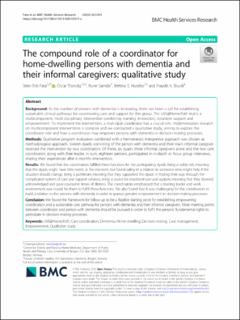| dc.description.abstract | Background
As the number of persons with dementia is increasing, there has been a call for establishing sustainable clinical pathways for coordinating care and support for this group. The LIVE@Home.Path trial is a multicomponent, multi-disciplinary intervention combining learning, innovation, volunteer support and empowerment. To implement the intervention, a municipal coordinator has a crucial role. Implementation research on multicomponent interventions is complex and we conducted a qualitative study, aiming to explore the coordinator role and how a coordinator may empower persons with dementia in decision-making processes.
Methods
Qualitative program evaluation combined with a hermeneutic interpretive approach was chosen as methodological approach. Sixteen dyads, consisting of the person with dementia and their main informal caregiver received the intervention by two coordinators. Of these, six dyads, three informal caregivers alone and the two care coordinators along with their leader, in sum, eighteen persons, participated in in-depth or focus group interviews, sharing their experiences after 6 months intervention.
Results
We found that the coordinators fulfilled three functions for the participating dyads: being a safety net, meaning that the dyads might have little needs at the moment, but found safety in a relation to someone who might help if the situation should change; being a pathfinder, meaning that they supported the dyads in finding their way through the complicated system of care and support services; being a source for emotional care and support, meaning that they listened, acknowledged and gave counsel in times of distress. The coordinators emphasized that a trusting leader and work environment was crucial for them to fulfill these functions. We also found that it was challenging for the coordinators to build a relation to the persons with dementia in order to pursue genuine empowerment in decision-making processes.
Conclusion
We found the framework for follow-up to be a feasible starting point for establishing empowering coordination and a sustainable care pathway for persons with dementia and their informal caregivers. More meeting points between coordinator and person with dementia should be pursued in order to fulfill the persons’ fundamental rights to participate in decision-making processes. | en_US |

